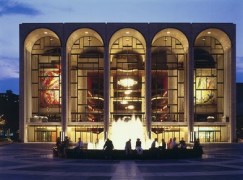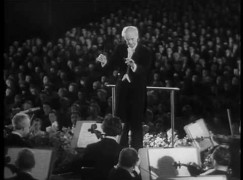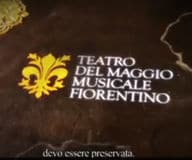Where will Gelb cut next?
mainWe know now that he wants to lose 50 administrative jobs (although he has persuaded the NY Times that it’s less).
We also know that he has to find $20 million in savings this season in order to make up a shortfall in donations and box-office.
Cutting 50 jobs does not save anywhere near $20 million. So where does he cut next?
Expect more sales of the family jewels.
Expect a cross-the-board trim to production budgets, little snips that he hopes no-one will notice.
The most worrying option that we’re hearing is a reduction in rehearsal time. It’s just a whisper at the moment, nothing down on paper, but that is not a good route to go down. It is a measure of Gelb’s desperation that it is even being contemplated. But where else can he save money? And how can he get disaffected audiences and donors to stream back to the Met?
Answers in the space below, please.






Fire Gelb. Fire the board. Gut the house and replace it with a 2800 seat auditorium. Will this bold approach ever happen? Unlikely. Becsuse of Gelb and the bosrd that employs him. We witness the Met’s agonizing Götterdämmerung, with the Met becoming its own memorial monument, a grand structure beteft of life, like a tomb. Meanwhile, Andris Neldons and the Boston Symphony have replaced the Met orchestra as the best opera performers in the country
You can’t fire the Met board. They are the bosses and, mostly, the company’s biggest financial donors.
And where would the money come from to gut the house and replace the auditorium with a 2,800-seater if not from the Board, the people who donate and raise money?
If we let the communist take over, Edgar’s proposal can be realized in 3 days.
Day 1: sack Gelb
Day 2: kick out the board
Day 3: tear down the hall
Day 4: install Analeck
To summarize, the only problem is that we have people who can’t think out of the box. Every problem has a solution.
Bears repeating: The situation is far worse than acknowledged, what with the disappearance of stars, vocal stars at that, of important voices and artists. The elephant in the room. Of course, the burden of the collapse of important artists and voices does not rest on Gelb’s shoulders. Little to nothing the man (or any other intendant) can do to quell the epidemic.
the met will fall if gelb is not fired and getting someone who can solved this there out there all you have to do is look. the house is 67 percent full that says alot
1) Fire the chorus.
No one goes to the opera to listen to the chorus.
There are literally tens of thousands of singers in New York who would give their right arm to appear on the Met stage and to put the Met on their résumé, absolutely for free.
2) Fire the stage hands who make more money than Gelb, and there are plenty of them.
But if every singer in New York has the Met on their resume, that credit would immediately count for nothing. It would be like expecting someone to be impressed that you dined at McDonalds. Can’t fire the chorus. Might as well fire the orchestra and stage hands while you’re at it. Then nobody would know what’s going on. That sort of plan might work out when a company puts on a production or two a year but no company could possibly put out an entire season of 30 shows under such circumstance.
While they’re at it, why not fire the entire orchestra and hire Julliard students to play for college credit or a local community orchestra to play? No-one goes to the Opera to see the orchestra, and I’m sure most of those students are good enough to play for a year or two before they graduate. The community orchestra, maybe not so much as far as being good, but they’d probably pay the Met and bring their own lunch just to play.
Once they graduate, since there will be no jobs left that pay a living wage in music
we could replace the stagehands with those graduates working as day laborers waiting in front of Home Depot on Staten Island. It’s win-win.
Heck, they could even get the lead roles from “America’s got Talent’, because let’s face it, most Americans couldn’t tell Bryn Terfel from Bryn Mawr anyway. As long as there’s a pretty face up there that can warble a bit, that’s probably good enough to drive ticket sales.
Or just shut the whole thing down, watch videos from opera produced elsewhere and re-purpose the Met stage to hold monster truck rallies, since that’s where the money is.
Good one, Bill! Spot on! I just wanted to give a quick reason why it wouldn’t be a good idea but you cut right to the chase. Some people really think the performing arts just happens by accident or it magically appears. They really have little idea of what all is involved!
Exactly! You cannot produce grand opera at the highest professional level if you give entire departments over to “hey, kids, let’s put on a show in the barn.”
The Met Chorus are among the hardest working musicians anywhere! They often begin rehearsals early in the morning- before 10AM- and get finished when the evening performance ends, which can be as late as midnight. Many of them have DMAs and most have MMs, which required years of specialized training and a ton of debt.
One doesn’t merely show up and be able to sing a performance; to have things come out right requires hours of rehearsal both off and on stage. Listen to recordings of operas from the Met from 20yrs ago vs those now and you can HEAR the difference that a well trained, well rehearsed, chorus makes. As for the ridiculous assertion that there are “tens of thousands of singers who… would sing for free”- those singers have day jobs to exist and couldn’t drop those to take days out of their schedules for what’s required of a good chorus. And, the cardinal rule of singers: Never perform for free. It devalues your commodity.
You obviously have no idea what your talking about when it comes to the stagehands. So maybe if you aren’t going to state facts you should probably take your hands away from the key board before you make another embarrassingly idiotic statement.
@ Herrera… Peter Gelb makes over a million dollars a year. His lawyer, who handles the problems Peter isn’t capable of handling, makes $1,000 an hour. I can tell you as a fact there is not one stagehand who makes close to that. And the chorus works just as hard as anyone else there.
Gelb never contributed one nickel of profit to CAMI under Wilford. At SONY Classical he got lucky by stumbling on the Titanic soundtrack which financed his loosing projects. Why anyone thought he made sense to run the Met is a mystery. Better to hire one of the carpenters for the job. Worked the last time.
No, it really didn’t. Volpe’s luck eventually ran out. The audience decline began in the 2001-02 season, and accelerated in his last several seasons. He knew which way the wind was blowing. Go back and look at the reportage on Gelb’s appointment and preparations to take the helm, and you are almost certain to see it mentioned that he would be taking over in a period when the Met had entered a steep downturn.
Also…how soon the people complaining about bad productions now forget all the bombs of the ’90s and early ’00s, the humdrum everyday casting propped up by a few big stars, the next-big-thing singers who were not, despite all the pushing they got. But some of this is the reality of a big opera house in any period. Not everything you throw at the wall is going to stick.
I suspect that is not strictly accurate. The two Horowitz recitals in Japan when he insisted on playing in the evening – New York time i.e. 11:00 am Tokyo time – earned Horowitz a fortune, and thus CAMI a more than decent commission, I’d expect. I’m racking my brains but cannot think of another Gelb moneymaker, although come to think of it I believe he was involved in the Karajan/Berlin Phil farce in Taiwan which showed up the very ugly and controversial money-generating schemes of both CAMI and its conductor.
I’m throwing out a hypothetical question here, but how could an institution go so horribly down the tubes in 10 years, the 10 years that Gelb has been at the helm?
While he wasn’t popular with the internet operatic set, one has to admit that when Joseph Volpe left the Met a decade ago, the institution has a relatively healthy endowment, a subscription base, and balanced budget. On top of that, while there is no question that the world suffered a massive economic crash in 2008, wealth has flowed back into New York at unprecedented levels. How did a ‘white glove’ institution not benefit from this?
If Slipped Disc didn’t report this news yesterday, the Times would have not reported it, and there would still be this ignorant sense of ‘everything is fine’ at the Met. Everything is not fine… without a massive financial influx, they can’t last beyond 2 more seasons. It is just math. They continue to pull down from the endowment (which during the last contract renegotiation they promised to increase, but that hasn’t happened).
And lets not forget, the Met did a bond offering for cash a few years ago. Those bond holders are going to demand the cash if the situation looks bad- Where has that $100,000,000 raised from the bond offering gone?
Thank you Boris well said ! Ticket sales had declined somewhat under Volpe but in the past ten years the drop off has been staggering. Let’s not forget the huge donation made by a generous patron in the form of subsidizing $40 tickets that could be bought every morning for that evenings opera : that campaign went on for ages all in an effort to put people in the seats. There is NO MARKETING .., have you seen any advertising for the Grand Opening night of the Metropolitan Opera ? No and you won’t. Peter Gelb hasn’t a clue how to sell it . We have the Met Museum with their Gala and glamor and stars and beautiful dresses and paparazzi and this could ALL be replicated at the Met if only Gelb gave a damn but he doesn’t. Long gone are the days of patrons arriving to a red carpet and glittering lights and flashing bulbs. The austere Mr Gelb likes his theatre as he likes his productions : minimalist stark clean and frigid.
As for the uninformed here who think that singing in that chorus is something their high school niece could do : here are some facts …
That chorus employs career opera singers who have either had solo careers and opted to be in one place to raise a family or career choral ensemble artists who have sung all over the world some in our own US military ! The selection process for those positions was fierce : the competition for the Met chorus is overwhelming with that office receiving applications / videos / recordings of candidates from all over the globe hoping to be granted an in person audition. The chorus is able to pick up anything and sight read it … it must be memorized shortly thereafter. They sing in 7 different languages and commit to the Met, door to door roughly 18 hours a day 6 days a week when it’s busy. As for the crew being paid more than GELB ?
No one is paid anything like 2.3 MILLION DOLLARS . Certainly not the crew who work longer hours than the chorus. The three main unions took pay cuts that were, at the time of ratification supposed to amount to
7% . Gelb further reduced everyone’s compensation by cutting even more rehearsal time ( resulting in injuries to crew and chorus trying desperately to choreograph intricate staging or scenery removal/ replacement ) the total losses coming closer to the 16% he originally asked for. He did NOT take a pay cut … he refused to take something ” unsustainable ” as you may recall him telling Diane Sawyer when she held his feet to the fire and clearly sided with labor in a television interview . All these cuts and he still can’t make HIS BUSINESS MODEL WORK . The Met was doing just fine before he became GM. Don’t forget that he ran Sony Classical into the ground BEFORE HE CAME TO THE MET ! That should have been red flag enough ! With a little digging I can see what Peter Gelb has really been doing with his time and passion over the last decade !
Here from the Mets own website advertising the new film THE OPERA HOUSE ( which looks wonderful ) I will let you see for yourselves that Mr Gelb has USED the Met to advance his own film career . His heart is not in being its GM. He is not good at it . He is really only interested in the HD BROADCASTS. That is not enough and his abject neglect of everything else is literally destroying the Greatest Artistic institution in this country . The Board of Directors had better take notice … I respectfully suggest finding a qualified interested replacement asap before the next season begins . Peter Gelb, the current General Manager of the Met. Froemke and Gelb have been collaborating on music documentary films since 1985, beginning with Ozawa, a look at the life of conductor Seiji Ozawa. Since then, their films together have included Vladimir Horowitz: The Last Romantic (1985), Horowitz Plays Mozart (1987), Karajan in Salzburg (1988), The Met in Japan (1989), Jessye Norman Sings Carmen (1989), Soldiers of Music: Rostropovich Returns to Russia (1991), Abbado in Berlin: The First Year (1991), Baroque Duet (1992) with Kathleen Battle and Wynton Marsalis, Accent on the Offbeat (1994) with Peter Martins and Wynton Marsalis, and the Grammy Award–winning Recording The Producers: A Musical Romp with Mel Brooks (2001). At the Met, they have worked together on The Audition (2009), about aspiring young opera singers, James Levine: America’s Maestro (2011), an American Masters presentation on PBS, and Wagner’s Dream (2012), about the making of the Met’s Ring cycle.
OK Great name one person that is going to raise $160 million a year in New York which is more than what Lincoln Center raises itself. Amd this is NYC fundraising competing with every single Arts organization out thrre. Who can take take over the artistic and administrative reigns. Now you understand the cunundrum. No one….I am no fan of Gelb but come on….Name someone…
Gelb seems an easy target – but the fact is that $300 million is a lot of money to come up with, for an opera company – even in NYC. Gelb could be disposed with, but the problem raising that figure will just be there for the next person.
For one person to give $30 million dollars – a lifetime of earning – seems very generous, should seem very generous. And they’d have to love opera a lot. If you need ten times that amount, every year – you need 10 new people every year… There are billionaires, sure. And I could be wrong, but I think those days are over.
Not enough people in that financial position, who are that crazy about opera.
Everyone seems to have forgotten the voluminous correspondence here only 3 years ago when Gelb threatened a lock out prior to the start of the season. He talked about the Met being on the edge of a precipice and of the need to generate around 17% in total savings. The talks went down to the wire – and then with nothing like his 17% was agreed by both parties – more like 4% or thereabouts. Everything was hunky dory again. The Met was saved and the stage set (sic) for a healthy future.
Well, as the totally incompetent manager he is, Gelb caved in spectacularly on that occasion. Clearly nothing concrete was achieved and so the axe is being wielded once again.
How the ludicrous Board of that once excellent House continue to put up with a man plainly unqualified for the job of General Director and even less for that of Artistic Director is one of the great mysteries of the opera world!
The layoff of 10% to 20% of nonunion employees at the Metropolitan is a signal to its unions that they will be asked — and expected to agree — to reduce headcount in the next round of labor-management negotiations. That is where the bulk of the expected cost savings will occur.
Then you better buckle up and reduce the work load. The union employees dont set schedules Mr. Gelb does. You need so many people to do certain jobs. You can’t cut man power without adjusting the workload.. The stage crew are the lowest paid per hour than most anywhere in the city. They make the money they do be cause of the schedules they have to work. The majority of the crew are working the hours of two full-time jobs.
You have to truck in the sets, they have to be built, they have to be rehearsed and then play. Then disassembled nightly for a different production the next days rehearsal and evening show.
They have constantly been asked to accomplish more with less time. Something is going to breakdown . You are barking up the wrong tree.
Although Met operas in HD are terrific, and I love them, I think they take people away from the actual live performances. Why spend $100-$200 on a seat at the Met, if you can go to your local movie house and see the performance for $20+/-.
Peter Gelb was very enthusiastic about HD, but maybe he ended up shooting himself in the foot.
In Yannick we trust.